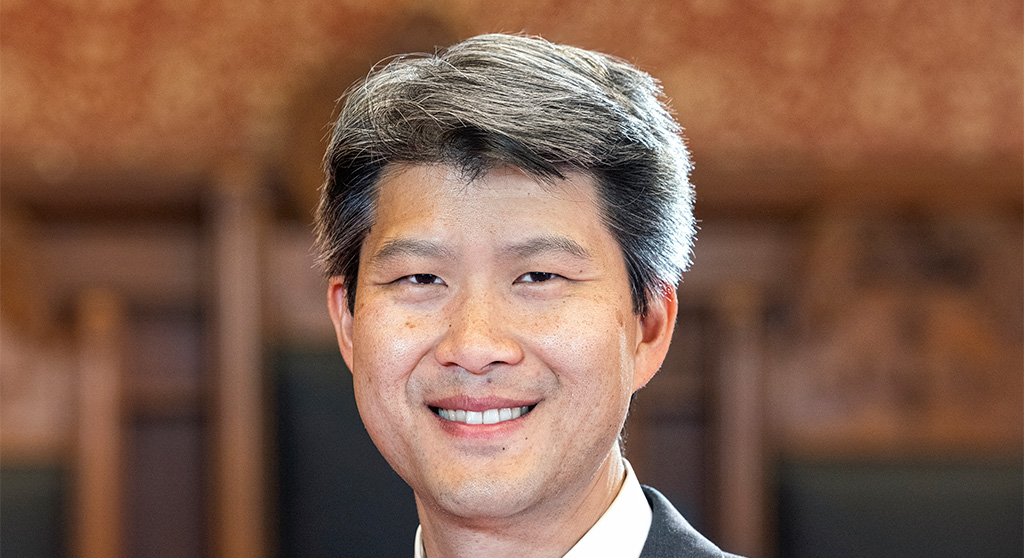Huang takes office, albeit Zooming from home, with fresh eyes on organizing work of City Hall

Yi-an Huang signs papers formally beginning his term as city manager – in his car, distancing himself after catching Covid on a family vacation. (Photo: City of Cambridge)
City Manager Yi-an Huang took office Tuesday – from home.
As a result of catching Covid on a just-finished family vacation, he conducted his first formal day of business not amid the backdrop of Cambridge’s circa-1888 city hall, but with the blurred background of a Zoom call. His swearing-in ceremony early in the day was a compromise too: Huang said in an online interview Tuesday afternoon that he sat in his car throughout, masked to guard against passing on his mild case of coronavirus while city clerk Diane LeBlanc administered his oath from just outside, under an umbrella in the rain.
His first day in City Hall as city manager will likely be Monday, the same day the City Council returns from a two-month summer break, Huang said, and take two of his swearing-in may be held Sept. 19.
But Huang has been working for much of the summer to ramp up to the job of city manager, and arrives with a sense of ongoing issues to prioritize – such as board appointments and lagging after-school programs – and how to organize his work in a three-year term running through Sept. 5, 2025.
“I’ve been really grateful for the summer transition period of building relationships, getting to know folks and getting up to speed on a lot of the issues and dynamics. There is so much happening in the city. It’d be a much bigger challenge to come in on Day One without some of that runway,” Huang said.
Ramping up
Huang, until recently executive director at the nonprofit Boston Medical Center, was appointed by the council on June 6 to replace Louis A. DePasquale, who retired from the City Manager’s Office on July 5 after six years in office – and a total 47 years in City Hall. During the transition between the two, Department of Public Works head Owen O’Riordan served as acting manager (and, coincidentally, caught Covid immediately after taking office.) Huang is the first city manager in since the 1980s who hasn’t been a Cambridge City Hall insider.
O’Riordan’s work allowed Huang time to meet less formally with department heads and people in the community to get up to speed, though “definitely I haven’t been able to get back to everybody that’s reached out,” Huang said. “It’s just a lot of folks.”
As city manager-elect, Huang engaged less formally with city business but was part of the process appointing a new acting fire chief and did some work examining a shortage of after-school program slots for kids. “It’s an issue that I really recognize is weighing on a number of families, and the team has been working super hard on it,” Huang said.
Getting organized
A meeting planned for later Tuesday would start working through what presentations and reports are expected for the first council agendas of the fall, said Huang and city spokesperson Lee Gianetti.
Either Monday or Sept. 19, a conversation with the council about the diversity of boards and commissions was expected, Huang said, a matter of some urgency with the “number of vacancies or expired terms on some pretty key boards.” The city manager makes appointments to the panels, but a charter change decided by voters 69 percent to 31 percent in November gives the elected officials added powers to confirm or reject his choices.
Exploring ways to improve how the council and staff work together is another thing Huang said he was excited about, including how to manage and prioritize policy orders passed in a night that might become significant demands for work by the city manager, Community Development Department officials and others.
The “awaiting reports” list that grows from week to week at the bottom of council agendas illustrates the importance of having processes and systems set up to support work. “There are ways that as a city we could improve how we organize what is ultimately just a really complex and significant portfolio of work that we need to tackle,” Huang said.
“Do a smaller number of things well”
While as a health executive he’s been exposed to business processes such as Lean Six Sigma, there was no specific system that he said would shape his approach to municipal government. “The concepts are incredibly powerful, but the exact format of the tool is less important,” he said.
Instead, he described a nuts-and-bolts approach of good organization and sensible staffing levels.
“It is true that we aren’t going to be able to do everything all at once. I would generally prefer to do a smaller number of things well and get them completed than to start a large number of things and leave them all half done,” Huang said, touching on a long-standing point of conflict between councillors and staff. “There will be some amount of needing to align with the council on what are the major priorities – what do we need to deliver on, and then for the city to execute well and deliver on those, and to be honest if there are things that we can’t get to or we don’t have the bandwidth to do.”
Staff may have to ask for “a little bit of runway to build a team that can tackle a greater agenda,” Huang said. It could avoid a dynamic, he added, that makes it feel as though councillors and staff are on opposite sides of an issue. “That alignment is really the piece that we need to work on … As an aspiration, my hope would be that the city and the City Council feel like we’re on the same team tackling a problem together.”



